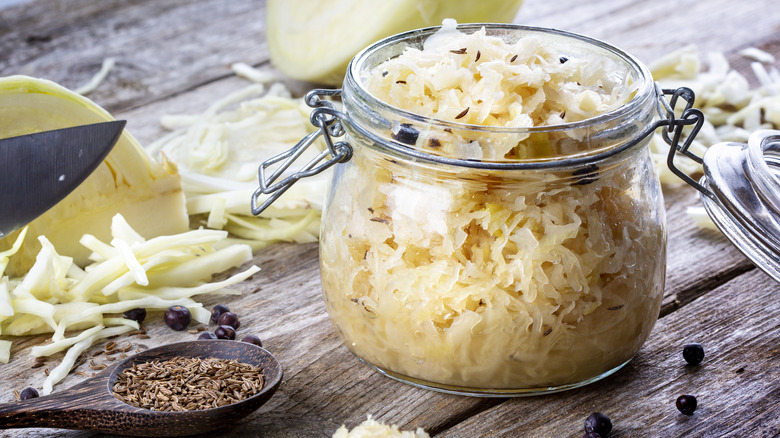Is Sauerkraut Any Good To Eat After It's Been Frozen?
There may not be a more classically German food than sauerkraut (even if it probably actually came from China). It's cabbage fermented in lactic acid that has a distinctive sour flavor. That's actually what the word "sauerkraut" means in German: sour cabbage. In addition to being available in regional varieties throughout Europe, it's a product that does what it says on the tin.
And aside from its flavor, the main thing sauerkraut is known for (much like other fermented cabbage products like kimchi) is its long shelf-life. When refrigerated, sauerkraut lasts around four to six months, so it's not going to go bad any time soon. But what if you want sauerkraut to last even longer? Is it the sort of food that can be frozen, or is that a genuinely terrible idea? It turns out you can definitely freeze sauerkraut — but you have to be careful about how you do so.
You can definitely thaw sauerkraut, but don't be reckless about it
To be clear, sauerkraut isn't one of those products like frozen salmon that is possibly better when frozen, but it's still good. In fact, evidence shows that it pretty much comes out of the freezer precisely the same as it went in. There are some caveats to the freezing process, however.
For example, you absolutely have to leave some space at the top of the container (which should be a plastic bag or container rather than a glass jar). The reason for this is simple: Much of sauerkraut is liquid, and when liquid freezes, it expands. As anyone who has ever put a soda in the freezer and forgotten about it can tell you, the result is minorly explosive and majorly messy. If you follow these rules, frozen sauerkraut lasts roughly twice as long as refrigerated, with a life span of 8-12 months.
Thawing is also an important thing to talk about here. Much like other foods, you want to thaw as slowly as possible. You could defrost sauerkraut in the microwave or on the counter, but the way water crystals break down will mean it loses a lot of its texture and flavor. Instead, try slowly thawing it in the fridge.
There are some foods you should never freeze
Though sauerkraut works out well when you freeze it, there are certain foods you really need to avoid giving the sub-zero treatment. This is particularly true of foods with high water content, such as tomatoes, lettuce, and avocados, which lose flavor and texture when you freeze them. Eggs are likewise an outright disaster.
Cheese is an interesting one; hard cheeses freeze pretty well, but soft cheeses like brie or camembert suffer a lot more. A lot of this concerns how quickly you thaw or freeze items, though. In the case of soft cheese, thawing it in the fridge preserves the flavor and some of the texture — just like sauerkraut. Even then, though, it's not going to be ideal.
As with everything else regarding cooking and food preparation, how to freeze or unfreeze food has an outsized effect on the result. The rule is basically to freeze quickly and thaw slowly — and sauerkraut is no exception.


